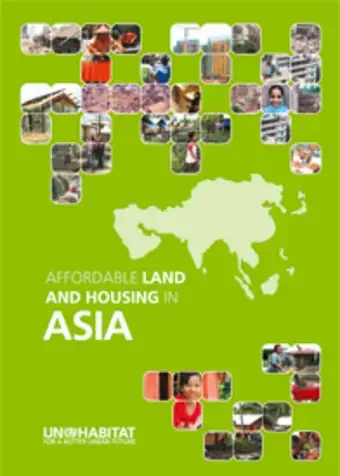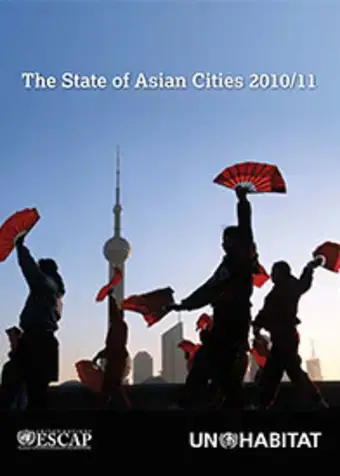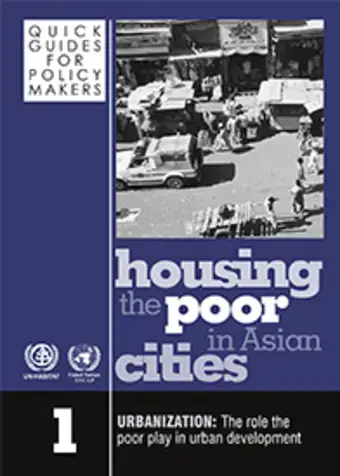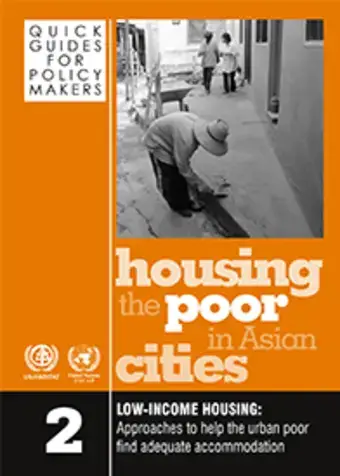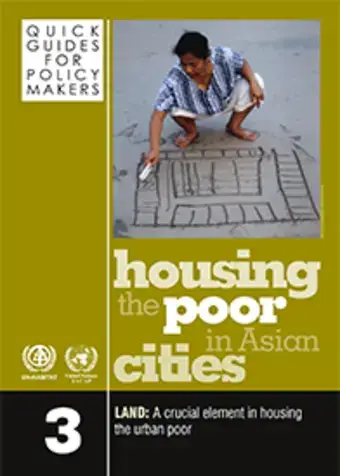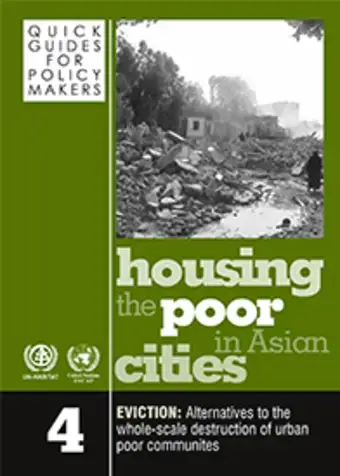 The dynamic and populous Asia-Pacific region is home to 3.7 billion people and represents 56 per cent of the world’s population. Comprising of 58 countries that stretch from Iran in the west to the Pacific Islands in the east, the region is perhaps also the most diverse in terms of economy, society, culture, environment and human settlements.
The dynamic and populous Asia-Pacific region is home to 3.7 billion people and represents 56 per cent of the world’s population. Comprising of 58 countries that stretch from Iran in the west to the Pacific Islands in the east, the region is perhaps also the most diverse in terms of economy, society, culture, environment and human settlements.
Due to the country’s particular exposure to climate related events, UN Habitat supports people and communities on Fiji in making their settlements more safe, resilient and sustainable. Technical support, consultation, trainings and assistance on different levels are provided to prepare decision-makers as well as the population for social, environmental and economic challenges in the present and the future.
Impact
Urban numbers
Challenges
Increasing impacts of climate change together with growing urbanization and climbing population numbers are major challenges the country and its population are facing. Rising sea levels, natural disasters increasing in frequency and intensity, soil erosion or flash flooding pose substantial threats across the country. Particularly in the context of informal settlements, poverty, unemployment, lack of sanitation and infrastructure often exacerbate climate change vulnerability. In Fiji, 20% of the urban population lives in informal settlements in high-risk peri-urban areas. Through its work, UN-Habitat supports institutional strengthening at the city- and community-level for enhanced local climate response and resilience strengthening.
Donors and partners
UN-Habitat remains the key urban advocate in Fiji and maximized opportunities for continued building awareness of both national and development partners surrounding the benefits of improved management of urban growth. An immediate outcome has been for continued support for policy dialogue (a new post-disaster component to the national housing policy) and strategic implementation as well as increased press coverage of inadequate housing, and the urgent need to address the challenges that the rapid rate of urbanization brings.
Contact
Legacy content
- Total value of UN-Habitat investments (2008-2015): US$ 199,782
- Total number of UN-Habitat projects (2008-2015): 4 projects
- Main donors: European Commission and the Africa, Caribbean and Pacific Secretariat through the Participatory Slum Upgrading Programme and the Government of Norway (Cities and Climate Change Initiative)
The Pacific has a very rapid rate of urbanization and high population growth and is not well enough prepared to cope with the challenges and opportunities that urban growth presents. UN-Habitat is well placed to assist Fiji to improve its urban management and planning practices and enable new thinking and actions about how best to evolve cities, towns and peri-urban areas for the future.
General information
UN-Habitat provides training, expert advice, proven tools and methodologies for small-medium sized urban centres within alignment of national needs and demands as articulated in National Development Strategies. In the Pacific, this is framed in assisting countries meet their commitments to the Pacific Urban Agenda (Initiative 13.5, Pacific Plan). Fiji has an urban population of over 455,000 not including those communities located on the periphery of council administrative boundaries. Some municipalities are urbanizing more quickly than others, but all are confronting challenges related to growth. These include urban poverty and employment, environmental risk, land administration and infrastructure provision and maintenance. Whilst considerable efforts in the last 5 years have seen the formulation and application of a national housing policy and the adoption of a pro-poor approach for poverty alleviation, there remains a significant challenge to keep up with the demand for housing and water and sanitation service provision. The 2013 Constitution enshrines the rights to these services.
UN-Habitat projects in Fiji
Current projects:
Cities and Climate Change Initiative (CCCI), Lami Town
Participatory Slum Upgrading Programme (PSUP)
The Participatory Slum Upgrading Programme has provided initiative for strengthening relationships between national and sub-national government and with NGOs such as the Peoples Community Network (and associated City Wide Upgrading project with the Asian Coalition of Housing Rights) as well as active inclusion of land stakeholders such as the Taukei Land Trust Board as a critical partner in the Town Wide Upgrading project (accessing traditional land for development). PSUP provides additional support to an increasing focus on the development and adoption of inclusive policies and strategies for slum upgrading in line with the PSUP principles and contributing to the achievement of MDG 7 C and D.
- Implementation Phase: Phase II
- Duration: June 2014 – December 2015
- Value: US$100000
- Donor: European Commission and, the Africa, Caribbean and Pacific Secretariat
- Implementing Partners: UN Habitat and the Ministry of Local Government, Urban Development, Housing and Environment; and the People’s Community Network (a local NGO affiliated with the Asian Coalition of Housing Rights)
- Profile cities/ location: Greater Suva Area (Lami Town, Suva City, Nasinu Town and Nausori Town), Nadi Town and Lautoka City
Regional Knowledge Management: Strengthening Pacific Urban Agenda Implementation
Key partners are national government, city and town councils, development partners.
UN-Habitat remains the key urban advocate in Fiji and maximized opportunities for continued building awareness of both national and development partners surrounding the benefits of improved management of urban growth. An immediate outcome has been for continued support for policy dialogue (a new post-disaster component to the national housing policy) and strategic implementation as well as increased press coverage of inadequate housing, and the urgent need to address the challenges that the rapid rate of urbanization brings. The PSUP has provided initiative for strengthening relationships between national and sub-national government and with NGOs such as the Peoples Community Initiative as well as active inclusion of land stakeholders such as the iTaukei Land Trust Board as a critical partner in the Town Wide Upgrading project (accessing traditional land for development). The Pacific’s inaugural regional Housing Workshop (October 2012) allowed for a learning exchange of Fiji’s housing policy development with other Pacific Island Countries. In terms of its climate and risk management projects, UN-Habitat’s role has been one of capacity building, technical input and knowledge management.
Contacts
Sarah MecartneyHPM-PacificUN-HabitatLevel 5, Kadavu House414 Victoria Parade Suva, Fijimecartney-unhabitat@un.org
Images

Solomon Islands
Overview
The archipelago with its six major and many hundred outer islands is one of the poorest countries in the region with a low level of human development. The islands are affected by floods, king tides and natural disasters (e.g. tsunamis) which are causing wide-reaching costs for the communities. UN Habitat supports the island’s urban management and planning practices, in particular with the implementation of a city-wide settlements upgrading strategy for Honiara, the islands’ largest urban area.
The Solomon Islands are facing increasing poverty and the economic performance of the country is lagging behind other Pacific countries. Together with the lack of environmental sustainability and the vulnerability to climate change and disaster risks, these are key challenges within the islands. Although 80% of the population live in rural areas, the Solomon Islands is considered to be one of the world’s fastest urbanizing countries, with an annual urban growth rate of 4.7 percent. This is leading to increased urban poverty and informal settlements with a lack of sanitation and infrastructure. Furthermore, employment rates are low and significant gender inequalities exist in all spheres. UN-Habitat focuses its work on informal settlements and seeks to reduce these obstacles.
80.3 of the population lives in rural areas and maintain subsidence livelihoods in villages of only a few hundred people.
20 % of young people are unemployed in the capital of Honiara.
19% of infants are not receiving adequate nutrition and 1/3 of children are stunted.
Annual urban growth rate of 4.7 per cent
Donors
Contact
Legacy content
- Total value of UN-Habitat investments (2008-2015): $ 120,000
- Total number of UN-Habitat projects (2008-2015): 3
- Main donors: World Bank, UNDP, European Commission and the Africa, Caribbean and Pacific Secretariat
- Implementing partners: Ministry of Lands, Housing and Survey, Honiara City Council
The Pacific has a very rapid rate of urbanization and high population growth and is not well enough prepared to cope with the challenges and opportunities that urban growth presents.
General information
UN-Habitat is well placed to assist the Solomon Islands to improve its urban management and planning practices and enable new thinking and actions about how best to evolve cities, towns and peri-urban areas for the future.
The agency provides training, expert advice, proven tools and methodologies for small-medium sized urban centres within alignment of national needs and demands as articulated in National Development Strategies. In the Pacific, this is framed in assisting countries meet their commitments to the Pacific Urban Agenda (Initiative 13.5, Pacific Plan).
The Solomon Islands has an urban population of over 113,000, of which over 70% reside in the capital city of Honiara. The country is confronting challenges related to growth - urban poverty and employment, housing, environmental risk, land administration and infrastructure provision and maintenance.
The government of the Solomon Islands is acutely aware of the need to enhance urbanization processes and outcomes. The Solomon Islands Urban Management Programme of Support (SUMPS) has been formulated by the Ministry of Lands, Housing and Survey provides a framework to integrate and coordinate an increasing number of pro-urban management interventions at national, provincial and Honiara city-level, supported by an increasing number of international development partners such as the World Bank, New Zealand, Australian Aid, UNDP and UN-Habitat.
Not only would better guided urbanization contribute to the sustainable development of the nation, it is also seen as critical in terms of addressing communal conflicts and peace building. An official announcement to embark on a National Urbanization Policy (February 2015) provides such an opportunity.
In 2015 the Ministry of Lands, Housing and Survey and the Honiara City Council issued a completely revised Urban Planning Scheme which takes into consideration resilience, settlements upgrading and well planned and managed public spaces. The development of a city-wide settlements upgrading strategy for Honiara, supported by UN-Habitat, designed to complement the Planning Scheme and feed into the city-wide settlements upgrading strategy, is also underway.
A comprehensive policy and legislative review was also conducted as part of the Participatory Slum Upgrading Programme. The provision of potable water to informal settlements has been a key challenge in Honiara. International support has focused on rural and peri-urban areas. UN-Habitat, led by the Water and Sanitation Programme of the World Bank, the Pacific Regional Infrastructure Facility, UNICEF and the ADB have supported a comprehensive situation analysis and policy advocacy programme with Honiara City Council and Solomon Water. In parallel, UN-Habitat has also embarked on testing the International Guidelines on Basic Urban Services in the Solomon Islands.
Honiara City launched its Climate Change Vulnerability Assessment in May 2015 and is finalizing a comprehensive Climate Resilience Strategy for 2016. Based on the Climate Change Vulnerability Assessment, Honiara City Council had developed operational guidelines for Disaster Management which were put to the test during and after the devastating floods of April 2014. Lessons learnt from the disaster have contributed to the comprehensive climate resilience strategy for Honiara.
In the wake of the April 2014 floods UN-Habitat supported the Humanitarian actors with its knowledge acquired in the development of the Honiara Vulnerability Assessment and the Ministry of Lands, Housing and Survey, as the national Shelter Cluster co-lead. In particular the discussion on resettlement and resilient housing was supported.
Contacts
Bernhard Barth - Bernhard.Barth@unhabitat.org
Human Settlements Officer UN-Habitat Regional Office for Asia and the Pacific ACROS Fukuoka Building, 8th Floor, 1-1-1 Tenjin, Chuo-ku, Fukuoka 810, Japan



